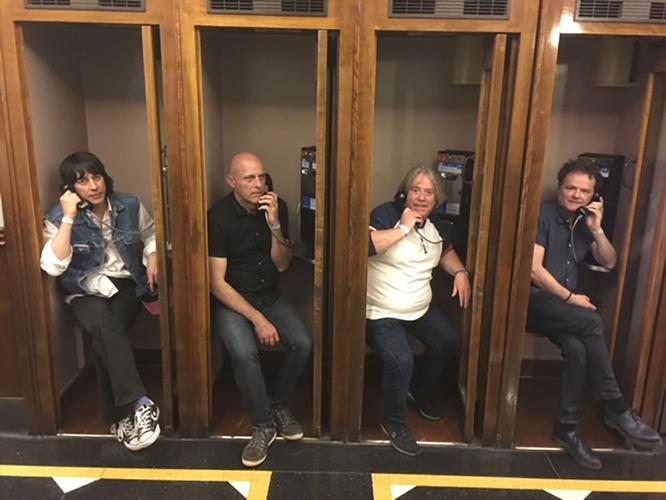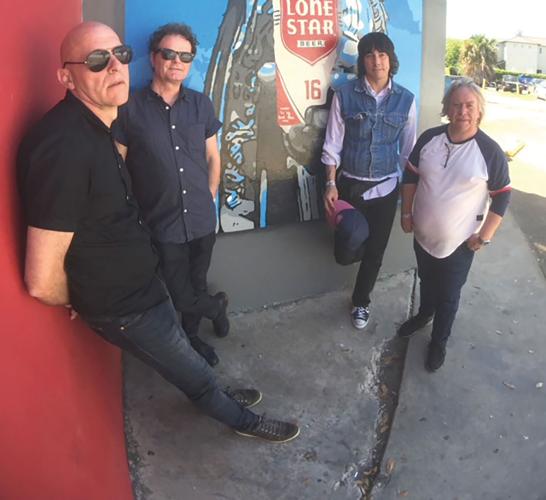
Protex
On the opening night of The Clash’s 1977 Out of Control Tour, Belfast gave the Londoners one of the most chaotic nights they ever had on the road. Members of Belfast underground bands like Stiff Little Fingers and Rudi, as well as musician and novelist Thomas Paul Burgess, were all in attendance. And as Protex’s Aiden Murtagh tells it, the show was a big part of his band’s origin story.
“We were all pretty young at the time — actually must have been about 16, maybe 17,” Murtagh says on a trans-Atlantic video call. “The first Clash gig was a big thing in Belfast. Firstly, there were very few bands that came over to play Belfast because of The Troubles.”
He’s referring to a period of high tension and violence that lasted from the late 1960s through the late ’90s, in which Unionists who wanted Northern Ireland to remain part of the U.K. fought with republicans who believed the land was rightfully a part of Ireland. Over the 30-year period, the conflict killed more than 3,000 people, more than half of whom scholarly studies say were civilians. Among much else that was disrupted, most tours steered clear of Northern Ireland; but for Clash frontman Joe Strummer and his band of political provocateurs, opening a tour at Belfast’s Ulster Hall was a statement. However, the insurance company pulled the plug on its coverage, forcing organizers to call off the show before The Clash could take the stage.
“And a riot started,” Murtagh explains, very matter-of-factly, as if that were the only logical outcome of shutting down a Clash show under those circumstances. “We went two streets away where the hotel was that The Clash were staying in. And we met Joe Strummer. And we spent the evening just talking music and politics — everything else, with Joe Strummer and then the rest of the band.”
The experience poured a concrete foundation for what would become Murtaugh’s band, who took their name from The Clash’s song “Protex Blue.” The evening’s events were exceptionally inspirational to Murtagh and his friends.
“That gig showed everybody, including ourselves, just how big the punk community was in Belfast,” he tells me. “Because during The Troubles in Belfast at that time, everybody really stayed in their own areas, because it was just too dangerous. Or it’s just what everybody did — and what you were conditioned to do by the paramilitaries as well.”
Within a year, Protex released their first single, the power-pop anthem “Don’t Ring Me Up,” via Good Vibrations — the label that sent other punk singles from Northern Ireland, like The Undertones’ indelible “Teenage Kicks,” out into the world. While many punk bands were becoming more aggressive, Protex cultivated a bittersweet beauty in their melodies. Music became an escape from the bleak, oppressive world Murtagh and his bandmates lived in daily.
“It was in our minds,” he recalls. “We did not want to write about The Troubles. I had people who’ve had experience of The Troubles. My family has. My family business has. And I really didn’t want to be writing about it.”

Protex
Instead, much like his Good Vibrations peers, Murtagh chose to write about girls, teenage rebellion and dreaming of leaving their lives behind for better ones. In many ways, their music had as much in common with the mid-20th-century American pop of Ricky Nelson as it did the Sex Pistols or The Jam. In their original three-year run, the Protex boys released one album and four singles, and eventually moved up to the much bigger Polydor Records. But in 1981, the band was dropped from its contract, and it split up. Around that time, British tabloids were echoing the sentiment many punks had been espousing for years, declaring punk dead.
For so many of the first-wave punk bands, that was how things concluded: Post-dissolution, the members would go on with their lives in work or school. Murtagh went into the hotel management business, and that’s where the story of Protex easily could have ended — to live on as oral history passed down by record-store clerks.
But then the punk sleuths of the Information Age found out about Protex, and their ebullient energy led to 2010 reissues of the band’s crucial catalog via revivalist imprint Sing Sing Records. “We didn’t even realize that there was anybody who wanted to hear us,” Murtagh says.
Quickly, offers came in for tours and a proposal to play Hotel Vegas in Austin, Texas, for SXSW, which the band ended up doing four times. And then fans in Austin began asking for new Protex music. “To be honest,” Murtagh says, “I hadn’t thought about that. So that just changed the whole dimension of the band.”
In the ensuing years, Protex released two more LPs, 2017’s Tightrope and 2022’s Don’t Waste My Time. Murtagh, now in his mid-60s, is the sole original member. With the group’s current roster, he’s making music that’s impressively faithful to the original formula — fast, loud, sweet and effervescent. You can hear it for yourself when the band makes their Nashville debut Saturday at Eastside Bowl, with support from The Sleeveens and Black Venus. And Murtagh has no plans for the story to end anytime soon.
“Hopefully we can start recording now this year for another album. As well as more gigs. We always want more gigs.”







